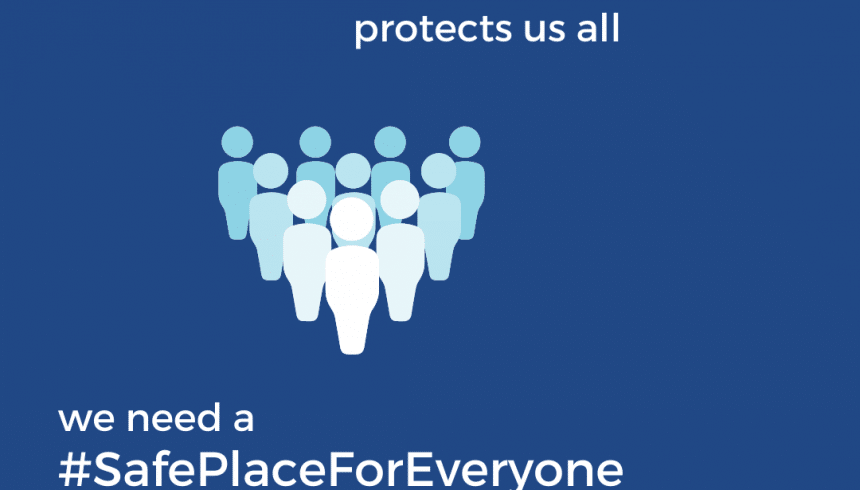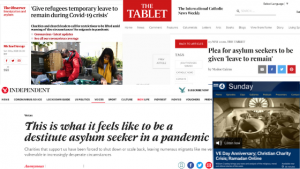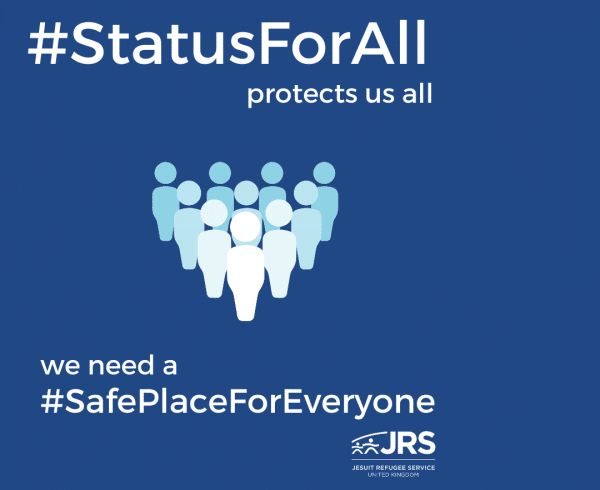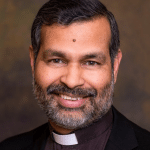Status for All
We have written to the Prime Minister asking that the government grant a period of “Leave to Remain” to everyone with insecure immigration status. We are joined by over 30 front-line facing organisations working with asylum seekers, refugees, and those with irregular immigration status.
A period of ‘leave to remain’ is the most effective way of ensuring people can access support they need during this crisis, such as accommodation and healthcare, and thereby protecting society as a whole.

WHAT WE'RE SAYING

![]](https://www.jrsuk.net/wp-content/themes/jrs/images/quotebracket-right.svg)
“Granting temporary leave to all migrants during this emergency is a simple, efficient and effective way to protect public health and harness the skills of many for the national cause. We cannot afford to have trained nurses, doctors, care workers and other key workers barred from contributing to society when they are desperately needed.
“The wellbeing of every person matters, more now than ever before: anyone unable to access stable housing or basic provisions places themselves and potentially others in danger. We have to act. The quickest and easiest solution is to grant everyone with an outstanding immigration application immediate leave and the right to work, and to provide a fast route to regularise others, bringing them out of the shadows and into the workforce. It is the only way to protect public health, get help to those who need it and get everyone contributing what they can. Now is the time to work together and unite to save lives.”
– Sarah Teather, Director of JRS UK
“For too long, our society has been failing some of its most vulnerable members. The pandemic has made this failure even clearer. We work with women who are struggling, who are homeless, who are hungry, who are unwell, who are facing abuse. But during this time of terrible hardship we are also seeing a great deal of solidarity and understanding of our shared humanity. It’s time to build on this surge of empathy, to reach out to those who have fallen through the gaps and ensure that they have the means to care for themselves and others. A grant of leave to remain for all those with insecure immigration status would give every individual the possibility of living their lives with safety and dignity, and contributing to society, through this crisis and after.”
– Natasha Walter, director of Women for Refugee Women
STATEMENTS OF SUPPORT

![]](https://www.jrsuk.net/wp-content/themes/jrs/images/quotebracket-right.svg)
Bishop Paul McAleenan
“I fully support the Jesuit Refugee Service and other charities in calling for a grant of leave to all with insecure immigration status during the current pandemic.
“One’s human dignity is the primary issue. In this crisis respect for human dignity demands that everyone without exception is given the right to protect themselves from Covid-19 and to receive medical treatment if necessary.
“We are constantly implored to protect ourselves and others for the Common Good of society. Those without permanent status should be given the opportunity and means to do so, to social distance, to self isolate, to access healthcare and so lessen the possibility of jeopardising public health.
“We have seen elsewhere how a grant of leave can protect those who are vulnerable and limit the spread of the pandemic. I sincerely hope our own government will consider taking the recommended steps in response to the extraordinary circumstances we face.”

Rt Revd Dr John Perumbalath
“I support this call from migrant and refugee support organizations for granting a period of leave to remain to our brothers and sisters with insecure immigration status.
“They belong to one of the most vulnerable categories of people in this unprecedented lock down situation and urgent action is needed to protect them.
“We are talking about human beings many of whom have endured hardship, violence and hostility, whose immune systems have weakened due to poverty, poor diet and the stress of facing hostile systems and environment.
“NRPF conditions push these people into a dangerous situation of helplessness and leave them abandoned by the wider society.
“The best way forward is to offer them a period of leave to remain with access to public funds and the labour market. This will also enable them to contribute to the recovery and rebuilding of our economy.”
Rt Revd Jonathan Clark
“I fully support the call for a period of leave to remain for those with insecure immigration status. This is important to allow these most vulnerable people the right to work, and to receive basic support, at any time and particularly now.
It is an issue of justice, and one of safety – justice for those who currently are disqualified from looking after themselves, and from receiving the help which our country offers to its other residents; safety both for them and for us all, as their situation leaves them vulnerable to infection themselves and therefore in danger of infecting others.
At a time when the government has demonstrated the capacity to invest huge sums in keeping our economy and society functioning, this is a simple and practical step, with huge positive benefits for us all.”
IN THE PRESS

![]](https://www.jrsuk.net/wp-content/themes/jrs/images/quotebracket-right.svg)
Our campaign has so far been featured in:
- The Observer
- The Tablet here and here
- On BBC Radio 4’s Sunday Program. (Listen to JRS Director Sarah Teather at 18 min 53 secs)
- an article published in the Independent from one of the members of our ‘Refugees Call for Change’ self advocacy group.

THE LETTER
THE LETTER

![]](https://www.jrsuk.net/wp-content/themes/jrs/images/quotebracket-right.svg)
Dear Prime Minister,
Re: leave to remain during COVID-19 pandemic
We hope that your recovery continues apace and that you will soon be back to full health.
We write as leaders of organisations supporting refugees, asylum seekers and migrants to ask you to grant a period of leave to remain, with recourse to public funds and access to the labour market, to all those with insecure immigration status. This is a vital step to protect public health during the COVID-19 pandemic. At a time when public health demands that everyone has ready access to housing and healthcare, insecure immigration status acts as a barrier and puts everyone’s health at risk.
There are a number of reasons why this is the right thing to do at this time:
Homelessness makes social distancing and self-isolation impossible, and increases vulnerability to infection. The government has rightly taken steps to provide accommodation for people who are street homeless but those without secure immigration status will be wary of making themselves known to local authorities while the threat of enforcement action remains. Furthermore, No Recourse to Public Funds rules have prevented local councils from accessing funding to accommodate and support people. At the moment, local authorities are being left to navigate complex questions about what support can be provided to whom and what funding source to use, which ultimately leaves some people on the street due to their immigration status. A more effective and comprehensive response would be to issue leave to remain for everyone who currently has insecure immigration status, so enabling everyone to access support, which would enable wider public health to be protected.
There is strong evidence that NHS charging and data-sharing between the Home Office and the Department of Health and Social Care can deter migrants from accessing healthcare, even for diseases that are exempt. The government has rightly exempted treatment for COVID-19 from the health charging regime, but people without secure immigration status are deterred from accessing treatment by the knowledge that, should they test negative for COVID-19, they may be charged for any treatment they need, and their data may be passed to the Home Office. People are also deterred from seeking healthcare for underlying conditions – and these conditions ultimately make them more vulnerable to COVID-19. Difficulty in accessing medical care means that people are likely to present late to health services by which time their health problems have become more severe. This increases the risks to the public as well as to the individuals themselves.
Even those in housing, such as NASS asylum accommodation or emergency housing, are in a precarious situation. Adults and children who are without secure immigration status are often living in transient, poor quality housing and have overcrowded living conditions which make it impossible to follow government guidelines on social distancing and self-isolation.
Without the right to work or access to mainstream benefits, people with insecure immigration status often live in complete destitution and rely on small hardship grants or food parcels from charities. Even in normal circumstances, this means they face a day to day struggle for survival, and at the moment, with many charities closed and with restrictions on movement, this is leaving many already vulnerable individuals in dire circumstances. We are hearing heartrending stories of homelessness, exploitation and hunger.
By giving access to the labour market, a grant of leave ensures everyone is able to participate in our struggle against Covid-19. We cannot afford to have trained nurses, doctors, care workers and other key workers barred from contributing to society when they are desperately needed. This will bring people out of the shadows and into the workforce.
In sum, lack of secure immigration status continues to act as a barrier to accessing support, housing and healthcare and traps people in exploitative situations. Allowing people to regularise their status is the most effective way of ensuring they get the support they need during this crisis, and will thereby protect society as a whole.
To protect everybody, we are calling for this leave to remain to be granted, alongside ongoing decision-making, to those awaiting decisions from the Home Office, those who have been refused asylum, and those who are undocumented. It is imperative that those without immigration status feel safe in coming forward during the pandemic. Therefore, this grant of leave to remain must also include the possibility of renewal. For all the reasons outlined above, we also urge you to ensure that no one who currently has leave to remain loses it during the pandemic.
To ensure ready access to support and services, this new regularisation of status must occur alongside existing efforts to provide accommodation to everyone who needs it. NRPF conditions must be suspended, the hostile environment must end, and all NHS charging and data-sharing between the NHS Trusts and the Home Office should also be paused for the duration of the pandemic, irrespective of uptake of any new regularisation routes.
This is an unprecedented situation, and it requires a bold response. We are ready to do all we can to prevent the spread of COVID-19 and protect public health and stand ready to help you implement a policy that would bring people together in the struggle against this extreme challenge to public health.
Yours sincerely,
Sarah Teather, Director JRS UK
Natasha Walter, Director, Women for Refugee Women
Sally Daghlian, OBE, Chief Executive, Praxis
Celia Clarke, Director, Bail for Immigration Detainees
Zrinka Bralo, CEO, Migrants Organise
Julie Bishop, Director, The Law Centres Network
Ali McGinley, Director, AVID
Daf Viney, Director of Services, Hackney Migrant Centre
Jo Cobley, CEO, Youngroots
Brian Mitchell, Immigration Advisor, Notre Dame Refugee Centre
Benjamin Morgan, EEA homeless rights project coordinator, Public Interest Law Centre
Warren Lee, Early Action Development Worker, Southwark Day Centre for Asylum Seekers
Loraine Masiya Mponela, Chairperson, Coventry Asylum and Refugee Action Group
Robina Qureshi, Director, Positive Action in Housing
Mauricio Silva, Co-ordinator, Fatima House
Ibtisam Al-Farah, Cofounder – Training and Development Director, DEWA
Felix Kupay, Chairperson, Entraide (Mutual Aid)
Phil Davis, Coordinator, Hope Projects
Mel Steel, Director, Voices in Exile
Nazek Ramadan, Director, Migrant Voice
Denise McDowell, Chief Executive, Greater Manchester Immigration Aid Unit
Traci Kirkland, Head of Charity, Govan Community Project
Clare Moseley, CEO Care4Calais
Maya Esslemont, Director, After Exploitation
Marta Welander, Executive Director, Refugee Rights Europe
Chrisann Jarrett, co-CEO, We Belong
Diana Baxter, Partner, Wesley Gryk Solicitors LLP
Dr Edie Friedman, Executive Director, Jewish Council for Racial Equality.
Ake Achi, Founder and Director, Migrants at Work
Luljeta Nuzi, CEO, Shpresa Programme
Will Sutcliffe, Chair, Bradford City of Sanctuary
Joanne MacInnes, Director, West London Welcome Centre for Refugees and Migrants
Andy Jolly, Trustee, Birmingham Community Hosting Network
Tanya Long. Director, Samphire
Akwaaba
Ros Holland, Chief Executive, Boaz Trust
Sarah Jemison, Chair, BEACON




